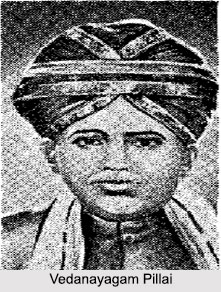 Vedanayagam Pillai was the first novelist of Tamil language and also a remarkable poet of 19th century South India. He was also a famous jurist and a social worker. He had an excellent personal quality, which kept him above all his fellowmen.
Vedanayagam Pillai was the first novelist of Tamil language and also a remarkable poet of 19th century South India. He was also a famous jurist and a social worker. He had an excellent personal quality, which kept him above all his fellowmen.
Early Life of Vedanayagam Pillai
Vedanayagam Pillai was born on October 11 in 1826 at a village called Kolathur in Tiruchirapalli district Tamil Nadu. Vedanayagam Pillai was a Tamil Christian by birth. His name was Samuel Vedanayagam Pillai. It is said that once his parents Savarimuthu Pillai and Arogya Mariammal fed and provided clothes to a distressed beggar. He was touched by their affection and blessed them saying that, in due course they would give birth to a son and the child should be named Vedanayagam. He took his early education from his father and later he learnt English language and Tamil language from one Tyagaraja Pillai. At a very young age, Vedanayagam Pillai started righting light, humorous verses for situations like a wedding or the arrival of a rare guest.
Career of Vedanayagam Pillai
Vedanayagam Pillai became a district munsif of Mayuram for thirteen years and came to be known as Mayuram Vedanayagam Pillai.
Literary Career of Vedanayagam Pillai
Vedanayagam Pillai started the composing of songs and books along with his profession as a district Munsif. He wrote total sixteen books. He wrote the first Tamil novel named the `Pratapa Mudaliar Charitram`. He had good knack in music too and played the instrument `Veena` very nicely.
Composition of Vedanayagam Pillai
Vedanayagam Pillai composed more than a thousand songs as a composer. His songs were praised by the great Tamil composer Gopalakrishna Bharati. It is said that Pillai used to sing all his songs in front of Bharati after composing them to get the feedback from him. His poetry “Thembhavani†was very popular in colonial Tamil literature.
Contemporary of Vedanayagam Pillai
Some of the contemporary of Vedanayagam Pillai were the great Tamil poet and litterateur, Meenakshisundaram Pillai, Ramalinga Vallalar and Subramanya Desikar, the Mahasannidhanam of Tiruvava-duthurai Math. He knew very well about the Bible and also `Tirnkkural` as he was core secular.
Social Works of Vedanayagam Pillai
During1876-1888 famine in Tamil Nadu, Vedanayagam Pillai distributed all his wealth and material resources to rehabilitate the victims. This nature of Pillai made the great composer Gopalakrishna Bharati to compose the song, `Neeye purusha merit` in his praise, which means, `You are the meru among men`. His songs fascinated even the conventional and rigid specialists of Tamil music.
Death of Vedanayagam Pillai
Vedanayagam Pillai died on July 21, 1889. After his death a newspaper paid homage to him by writing, "Only a few men deserve the name of `gentlemen` and if the word can with perfect propriety be applied it is to this great man". The lines of the newspaper were justified by the life story of this great composer.
Related Articles
Regional Indian Literature
Tamil Literature
Indian Literary Personalities
Indian Literature
Modern Indian Literature













